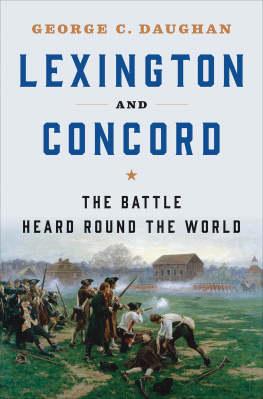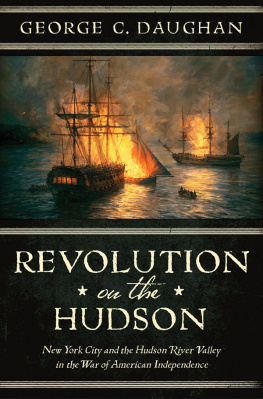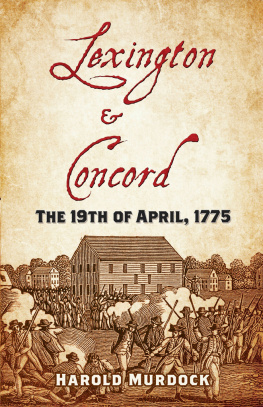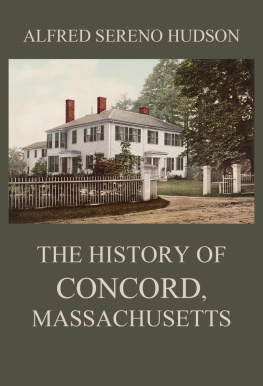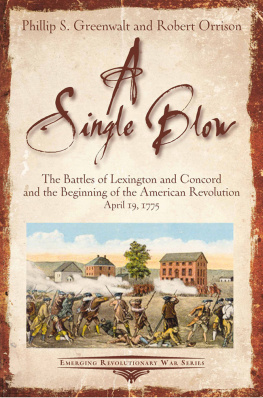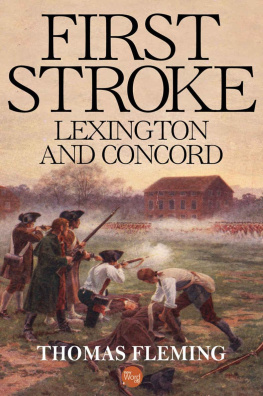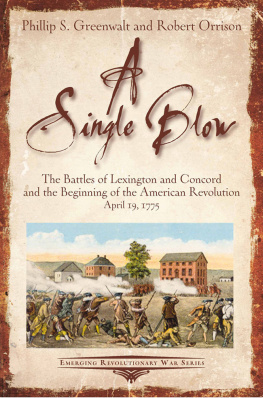
GEORGE C. DAUGHAN
LEXINGTON
AND
CONCORD

THE BATTLE HEARD
ROUND THE
WORLD


Concord Bridge, a painting by Mark Fountain, photographed by Ken Harvey.
O N January 19, 1774, John Hancocks merchant vessel Hayley reached Dover, England, with a cargo that included the latest newspapers from Boston. Their front pages were covered with the sensational story of an event that had taken place the night of December 16, 1773, in Boston Harbor. A huge crowd of Bostoniansnumbering in the thousandshad gathered at Griffins Wharf to watch in ceremonial silence as a hundred well-organized townsmen, thinly disguised as Mohawks, boarded the British cargo vessels Dartmouth, Beaver, and Eleanor and, working nonstop for almost four hours, dumped 342 smashed-open chests of the East India Companys teaa whopping 92,000 poundsinto icy water to protest being taxed without their consent. It appeared that nearly the entire city of fifteen thousand was defying the British government and nothing was being done about it. Lawlessness reigned supreme.
While news of the dumping sped overland to London by word of mouth, the Hayley continued her voyage, under Hancocks most trusted skipper, James Scott. He shaped a course north around Margate to the Thames, and then upriver to Gravesend. From there, the incendiary newspapers were delivered to Londons St. Jamess Chronicle, which published the story of Bostons Tea Party on Saturday, January 22. Two days later, the Public Advertiser had a full account as well. Soon the entire country knew what had happened.
The official report of the royal governor of Massachusetts, Thomas Hutchinson, arrived at Whitehall, the governments administrative offices, on January 27, confirming the newspapers story. Deeply shaken, the British cabinet met the following evening at the grand London residence of one of its more belligerent anti-American members, Henry Howard, Earl of Suffolk. As was their custom, ministers, who included Lord North, the first (prime) minister, discussed the incipient crisis over a splendid dinner, including plenty of excellent French wine.
They knew they had a major problem on their hands. The event in Boston was not a minor disturbance on the fringes of empire, but the latest in a series of direct challengesdating back to the Stamp Act crisis in 1765that Massachusetts radicals had directed at British authority. The angry ministers agreed that a powerful response was required. If left unchecked, Bostons malcontents could threaten the empire.
King George III was of the same mind. Even more upset than his ministers, he saw the Tea Party as confirmation of his long-held belief that Britain had mishandled the Americans for years. Time and again, London had foolishly tried to placate them, instead of demanding that they obey the laws passed by Parliament and threatening dire consequences if they did not. He was convinced that the Tea Party never would have happened had a resolute government stood firm and enforced the Stamp Act. He deeply regretted that he had ever allowed the law to be repealed.
His Majesty was particularly incensed about the Tea Party because he had supported keeping a tax on tea back in 1770, when Lord Norths government was repealing the Townshend duties (1767 to 1770), which had been conceived as a substitute for the Stamp Act. Colonists were so bitterly opposed to the Townshend taxes that they were doing more harm than good, and North wanted to get rid of them.
The ministry agreed with him in general, but split over whether to keep a single duty on tea. The king tipped the balance in favor of those who wanted to retain it. On March 5, 1770, he told North that even though there is no inclination for the present to lay fresh taxes upon them.... I am clear that there must always be one tax to keep up the right, and as such I approve of the tea duty. North did as the king directed and kept the tax.
His Majesty felt that the challenge from Boston put the entire empire in jeopardy. If obedience to the mother country was not restored in Massachusetts, an unraveling could begin until Britain was reduced to an insignificant island off the coast of Europe. Restoration of Londons authority became an obsession.
At this point in Britains history the king had acquired enormous personal power. On a matter of this magnitude, he was easily able to obtain approval from the ministry and Parliament for drastic remedies to rid the colonies, particularly Massachusetts, of dissidents permanently.
Lord North was his willing, albeit at times uncertain, instrument. North was the son of the elderly Earl of Guilford, and was called lord as a courtesy. He was chancellor of the exchequer and first lord of the Treasury, as well as leader of the House of Commons, but he was not a prime minister in the modern sense. The British government was in transition at the time, moving, or more accurately muddling, its way toward a modern parliamentary system that would not emerge until after 1783, when William Pitt the Younger took the reins of power following George IIIs gross mishandling of the American crisis.
For Lord North to have been the actual, as well as titular, head of government, he would have needed strong convictions about how American discontent should be handled, and he would have needed to use his considerable parliamentary skill to have his policy adopted.
Earlier in the eighteenth century, strong parliamentary leaders such as Robert Walpole, Henry Pelham, and Thomas Pelham-Holles, 1st Duke of Newcastle, as well as William Pitt the Elder, had been able to lead the country, but they had had strong convictions that North lacked, and theyd had George I and George II to deal with, not George III. Pitt, of course, did have to contend with young George III, who ascended the throne in 1760, at the age of twenty-two. The young monarch turned out to be quite different from his predecessors. In spite of Pitts great success during the Seven Years War, His Majesty soon dismissed him, labeling him mad Pitt for wanting to expand the already long war to include Spain. The young monarch, under the influence of his mentor, Lord Bute, wanted to end it.
Lord North bore little resemblance to Pitt. He had scant knowledge of America and no firm convictions about how to deal with Massachusetts. The king, on the other hand, had a keen interest. He had studied the colonies and had acquired a surprising degree of information, albeit with little real understanding or sympathy. By 1774 he had developed strong convictions about what needed to be done to end colonial disturbances.
A confused, uncertain North rationalized his subservience to the monarch by insisting that the kings policies were what the House of Commons wanted, which was undoubtedly true. Nobody could read the temper of the House as well as North. In March of 1774, he tried to curry favor with both king and Commons by taking up the universal cry against the Tea Party. He stood in the House and solemnly declared, Let it go forth to the world, that the Parliament of Great Britain will protect their subjects and their property. It was a pronouncement unworthy of a man with Norths subtle mind. He must have had serious doubts about the kings approach to America, but he consistently refused to act on them.
Next page
